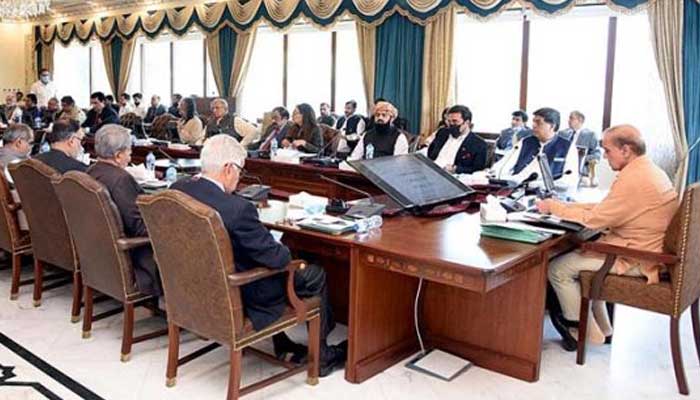Cabinet okays two bills related to cyberspace security
Stakeholders advise against passage of bills in haste
ISLAMABAD: The federal cabinet has approved two bills relating to cyberspace — the Personal Data Protection Bill 2023 and the E-Safety Bill 2023. It is the view of the government that existing regulators such as PTA and Pemra have been unable to scrutinize or regulate social media and online media sites in the country.
The E-Safety Bill, 2023 is reportedly to bring digital media platforms under strict regulations whereby a separate regulatory body is proposed to be established to penalize those who commit any violations. This bill is aimed at regulating web-based channels and online news websites for which a separate regulatory is proposed to be established which will be empowered to impose a penalty if a web-based channel or online media outlet is found to have aired or published any information maligning someone.
The Personal Data Protection Bill, 2023 is meant to govern the collection, processing, use, and disclosure of personal data and to establish and make provisions about offences relating to violation of the right to data privacy of individuals by collecting, obtaining, or processing of personal data by any means.
‘Personal data’ means any information that relates directly or indirectly to a data subject, who is identified or identifiable from that information or from that and other information in the possession of a data controller and/or data processor, including any sensitive or critical personal data. Under the proposed bill, the collection, processing and disclosure of personal data shall only be done as necessary in compliance with the provisions of the approved law.
According to the bill, within six months of passage of the law, the federal government is to establish a commission to be known as the National Commission for Personal Data Protection (NCPDP) of Pakistan for the purposes of the law. The proposed legislation -- both bills -- have elicited strong reservations from digital rights activists and advocacy think-tanks. Internet advocacy group Bolo Bhi, in a statement issued on Wednesday, has said that “legislation prepared in secrecy and passed in haste disregarding input and clear reservations, serves no protective purpose but reeks of nefarious designs to further curb the rights and liberties of citizens”, adding that “these bills must not be passed.”
Bolo Bhi has said that both the bills, “if moved in the National Assembly of Pakistan, [should] be deferred to a standing committee for further deliberations, which should be open and transparent..”
In a tweet, PPP’s Farhatullah Babar has also criticized the manner in which the digital bills have been approved by cabinet, writing that it is “wrong for a coalition government to push through far reaching digital related legislation hurriedly [and] in [an] opaque manner in its last days. Not taking on board even coalition partners let alone all stakeholders [is] deeply disturbing”.
Journalist and digital rights and civic responsibility advocate Farieha Aziz has tweeted that: “Pakistan’s Personal Data Protection Bill 2023 must not be passed in haste or we will end up with another PECA. Industry and rights groups have both expressed reservations. While input was provided to the ministry over the years, substantive issues remain.” The bills will now be moved to the Cabinet Committee for Disposal of Legislative Cases (CCLC) and then tabled in parliament.
-
 New Guest Host Announced For The Kelly Clarkson Show
New Guest Host Announced For The Kelly Clarkson Show -
 Why Prince William’s Statement Over Jeffrey Epstein ‘says A Lot’
Why Prince William’s Statement Over Jeffrey Epstein ‘says A Lot’ -
 Paul McCrane Reveals Why Playing Jerks Became His Calling Card
Paul McCrane Reveals Why Playing Jerks Became His Calling Card -
 Prince William, Kate Middleton Thrashed For Their ‘bland’ Epstein Statement
Prince William, Kate Middleton Thrashed For Their ‘bland’ Epstein Statement -
 Bad Bunny Stunned Jennifer Grey So Much She Named Dog After Him
Bad Bunny Stunned Jennifer Grey So Much She Named Dog After Him -
 Kim Kardashian's Plans With Lewis Hamilton After Super Bowl Meet-up
Kim Kardashian's Plans With Lewis Hamilton After Super Bowl Meet-up -
 Prince William Traumatised By ‘bizarre Image’ Uncle Andrew Has Brought For Royals
Prince William Traumatised By ‘bizarre Image’ Uncle Andrew Has Brought For Royals -
 David Thewlis Gets Candid About Remus Lupin Fans In 'Harry Potter'
David Thewlis Gets Candid About Remus Lupin Fans In 'Harry Potter' -
 Cardi B And Stefon Diggs Spark Breakup Rumours After Super Bowl LX
Cardi B And Stefon Diggs Spark Breakup Rumours After Super Bowl LX -
 Alix Earle And Tom Brady’s Relationship Status Revealed After Cosy Super Bowl 2026 Outing
Alix Earle And Tom Brady’s Relationship Status Revealed After Cosy Super Bowl 2026 Outing -
 Why King Charles Has ‘no Choice’ Over Andrew Problem
Why King Charles Has ‘no Choice’ Over Andrew Problem -
 Shamed Andrew Wants ‘grand Coffin’ Despite Tainting Nation
Shamed Andrew Wants ‘grand Coffin’ Despite Tainting Nation -
 Keke Palmer Reveals How Motherhood Prepared Her For 'The Burbs' Role
Keke Palmer Reveals How Motherhood Prepared Her For 'The Burbs' Role -
 King Charles Charms Crowds During Lancashire Tour
King Charles Charms Crowds During Lancashire Tour -
 ‘Disgraced’ Andrew Still Has Power To Shake King Charles’ Reign: Expert
‘Disgraced’ Andrew Still Has Power To Shake King Charles’ Reign: Expert -
 Why Prince William Ground Breaking Saudi Tour Is Important
Why Prince William Ground Breaking Saudi Tour Is Important




